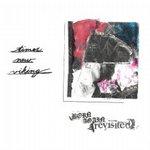
Times New Viking Born Again Revisited
(Matador Records)
Lo-fi’s no revolution. It’s been around since Bob Dylan and The Velvet Underground made their closet mixes and Basement Tapes in the ‘60s and ‘70s. Back then, it was all about authenticity—hearing musicians talk, laugh, make mistakes. When the genre boomed in the mid-‘90s it was a lot more self-conscious, mirroring similar (albeit decades-old) developments in visual art and classical music. But it’s been a decade and a half; lo-fi’s stagnating. Today, it’s not so surprising that the genre has been sub-categorized based on what’s buried underneath layers of crud—‘60s pop, surf rock, girl group or acoustic folk. However, it’s a mark of lo-fi’s ubiquity rather than innovation that subgenres have now sprung up based on the layers of crud themselves—the varying styles, textures, and thicknesses of the hisses, fuzzes, hazes, crackles, etc. So what, if anything, is keeping the genre relevant?
Some bands make relevant albums by being truly innovative. See, for example Nodzzz, who replaced dour self-importance with cowbells and yelping, tossing off ten songs that come in at under 16 minutes—brevity which parallels the rise of the 20-second ringtone as the music industry’s most profitable sector. Most bands are simply prolonging the genre’s decline by playing insensibly catchy pop under the sonic crust we’ve come to know it for. Failing either, we’re left with the dull ad nauseums of the musical record. And that, in a sentence, is Born Again Revisited.
Times New Viking’s last album, 2007’s Rip It Off, featured lines like “I need more money, ‘cause I need more drugs.” Self-seriousness without innovation is just pretentious, so their flippancy was a welcome respite from the near-emo lyrics of noise-pop contemporaries (see: “We only hope when we’re dead / Get no joy always hate within”, off No Age’s Weirdo Rippers, released the same year). However, Born Again Revisited sees them taking aim at the outside world, which proves relentlessly dull. It’s not that 9/11 or Martin Luther King should be inviolate topics, but to mock them in the shallow, self-admiring way that Times New Viking do is pretty much the definition of pretentiousness. Even worse than the lyrics, though, are the songs themselves. Rip It Off surrounded easily recognizable melodies with a comparatively gentle haze. Here, the hooks are weaker—and, consequently, they get harder to locate under more abrasive washes of noise (all the better to conceal poor songcraft).
Maybe the album’s mediocrity isn’t so much a mark of Times New Viking’s songwriting skills as presentation. After all, this is the same band that, in their cover of Arcade Fire’s Neighborhood #1 (Tunnels), transformed one of the most climactic melodies of the decade into a weak, watery trickle of a song. That cover (featured on Merge Records’ 20-year-anniversary compilation) made it apparent that Times New Viking doesn’t consider hooks and melodies inextricable from lo-fi production—begging the question: if the layers of crud are just an accessory to the album, why bother including them in the first place? One is left to conclude that Times New Viking sees lo-fi as little more than a marketing gimmick; one that sells tedious records to aging generation of hipsters clinging to tired scenes.
It doesn’t take a whole lot of originality—or even skill—to plug ‘60s pop through a beat-up Fender Frontman and record it with a secondhand Walkman, so it sure helps to have a gripping backstory. Maybe your frontman was a member of the Children of God cult as a kid, for example, or had a widely publicized breakdown in Barcelona. Times New Viking don’t have any of this—nor, moreover, do they have the same talent for pop songcraft that defines superlative lo-fi cuts like So Bored or Lust for Life. Instead, they get by piggybacking on a trend they’ve contributed little to, drowning dull hooks in washes of abrasive noise. Bands like Times New Viking give a bad name to what small originality other lo-fi bands possess.
3 January, 2010 - 19:40 — Michael Skinnider